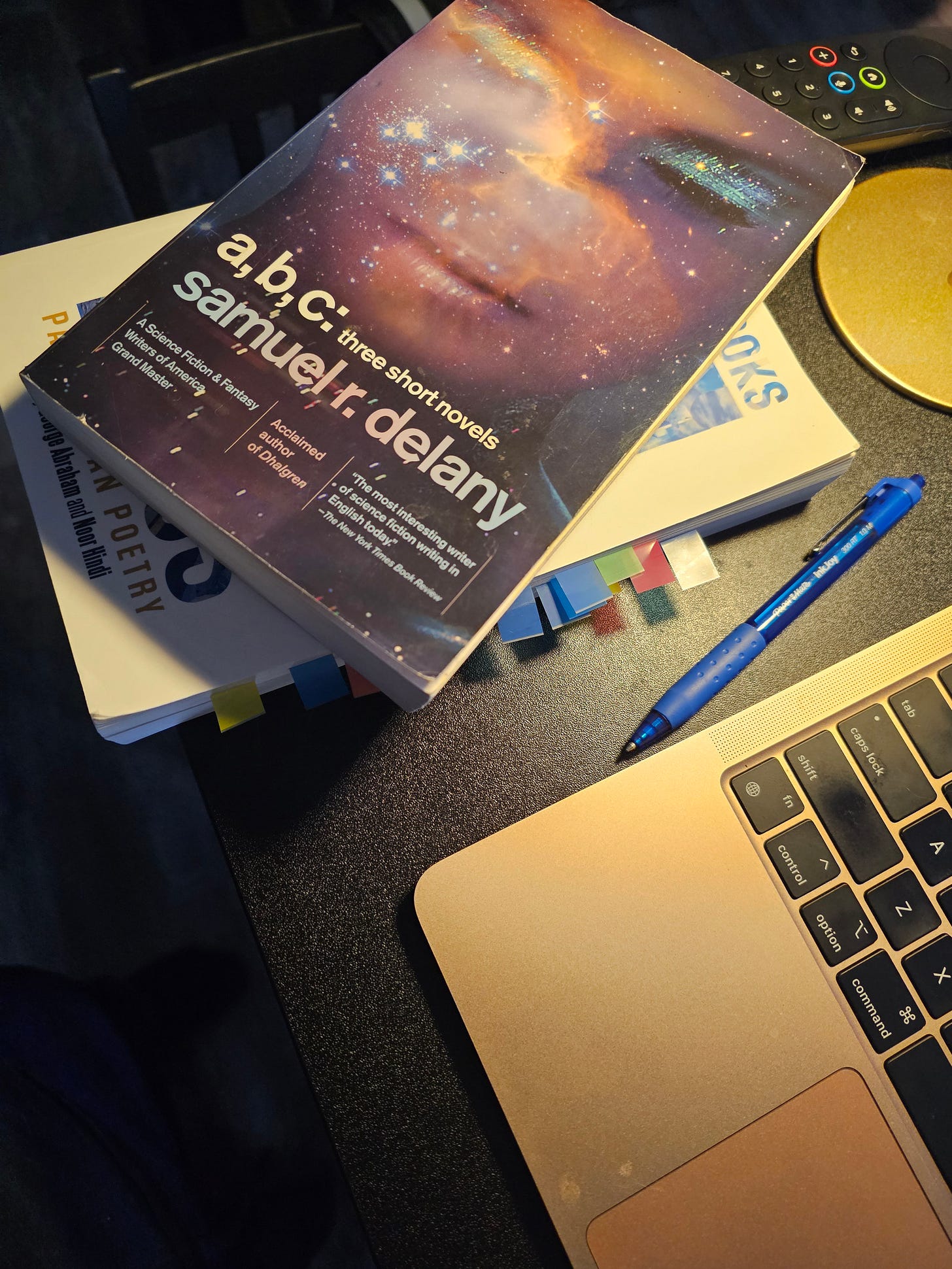Quiet Skill and Hidden Mastery in Samuel R. Delany’s Jewels of Aptor
Looking back at an old favorite Delany book, The Jewels of Aptor.
Writing Skins is a reader supported author newsletter that shares excerpts from an award nominated speculative fiction writer’s craft journals. It offers a vulnerable, funny, and interesting look at the writing life, craft, and storytelling.
Craft Chat is the writing craft section of the newsletter where subscribers and me go through a subject, piece of media, or technique together.
I first read Samuel R. Delany’s novella The Jewels of Aptor in 2016 or 2015 because I had decided to be a speculative fiction author and was reading through the greats I hadn’t read based off the Damon Knight Memorial Grand Master Award list. I was excited to read a Black writer after reading through writers like Heinlein, Gibson, Bradbury, and Asimov. While all of those writers are great and knocked my socks off with their control of story and language and pacing, they all wrote very white, straight stories that often were small minded and derogatory. In my mind, I was expecting something new and different in a loud and bombastic way in Delany’s prose and ideas. I had heard so much about how experimental Dhalgren is and how wild Hog is, but I was a baby writer and wanted to start out with the basics of Delany, which came in a three novella collection A, B, C: Three Short Novels (The Jewels of Aptor, The Ballad of Beta-2, They Fly at Çiron).
What I ended up reading in the book was something closer to Ursula K Le Guin’s quiet masterful use of language, character, and storytelling. Telling a story in a clear and philosophical way that, unlike Le Guin, didn’t bore me. I was intrigued and drawn in when I first read The Jewels of Aptor and as the story progressed and revealed a world (where at the time) it was unlike anything I had ever read. It was inspiring the way Delany is able to step away from his story and not let (at least in this book) his own skill and talent get in the way of the story. I barely saw him as the author in the pages and when I read through his craft book, About Writing, I was even more surprised to find out that the person wrote this clear scene of a man being whipped was a deeply skilled and thoughtful writer:
“So, like meat to be sliced and bid on, I was led out before the assembled sailors at the next sunrise and bound to the mast. I thought my wrath went all toward the First Mate now. But black turned white in my head, hard as something to bito into… ‘I want ten stripes on this one’s back deep enough to count easily with a finger dipped in salt.’…I didn’t fall until they finally cut the ropes from my wrists. Nor was it till I heard a second gold coin rattle down on the deck from the First Mate’s hand and the words to the crew, ‘See how a good sailor gets rich,’ that I made a sound. And it was lost in the cheer that sprang from the other men.” (The Jewels of Aptor)
There are many ways this retelling of a character’s whipping could have been written. Some authors would have leaned into a visceral and disturbing descriptions of this moment. Some authors would have chosen to deploy their control of language by doing the most with the prose. Delany did what he often does and used his control of language to describe a horrific event without being horrific because that’s not what this moment calls for.
Over the years, I’ve read several different Delany books, watched his lectures, read his nonfiction, and listened to him muse problematically about contemporary queer culture. For a long time, he and specifically his book The Jewels of Aptor was why I wrote the way I did, why I wrote my first novella that went on to get published in The Magazine of Fantasy and Science Fiction and get nominated for best novelette for the Ignyte Award alongside writers I admire and respect. In re-reading the book now almost 10 years later, I am searching for the mechanics in the magic.
When I first read the book, I could not for the life of me ‘get it’ at first. And then it sorta hit me at some point in the novel and I not only got it, but I was in. Fully in. The story snuck up on me. Delany’s skill wasn’t in your face like Bradbury’s or flamboyant like Heinlein’s or over my head like Le Guin’s. It was clean and clear and approachable, if not at times boring or too aimed at the audience of white scifi guys like in his novel Out of the Dead City. But the clearness of the prose and the clear storytelling that comes through in his writing feels like he’s allowing his characters to lead the story.
He, like many great writers, doesn’t allow the strings of his writing to show. The characters in the science fantasy novella do not feel like they are acting out on someone’s page or stage. It reads like I am watching through a magical glass these characters as they go about this wonderfully mysterious adventure of fantastical creatures, magic, and islands locked in time. I think it comes down to instead of asking oneself as the author how would I describe or write this moment but how would this character—this person describe this moment in their life.

